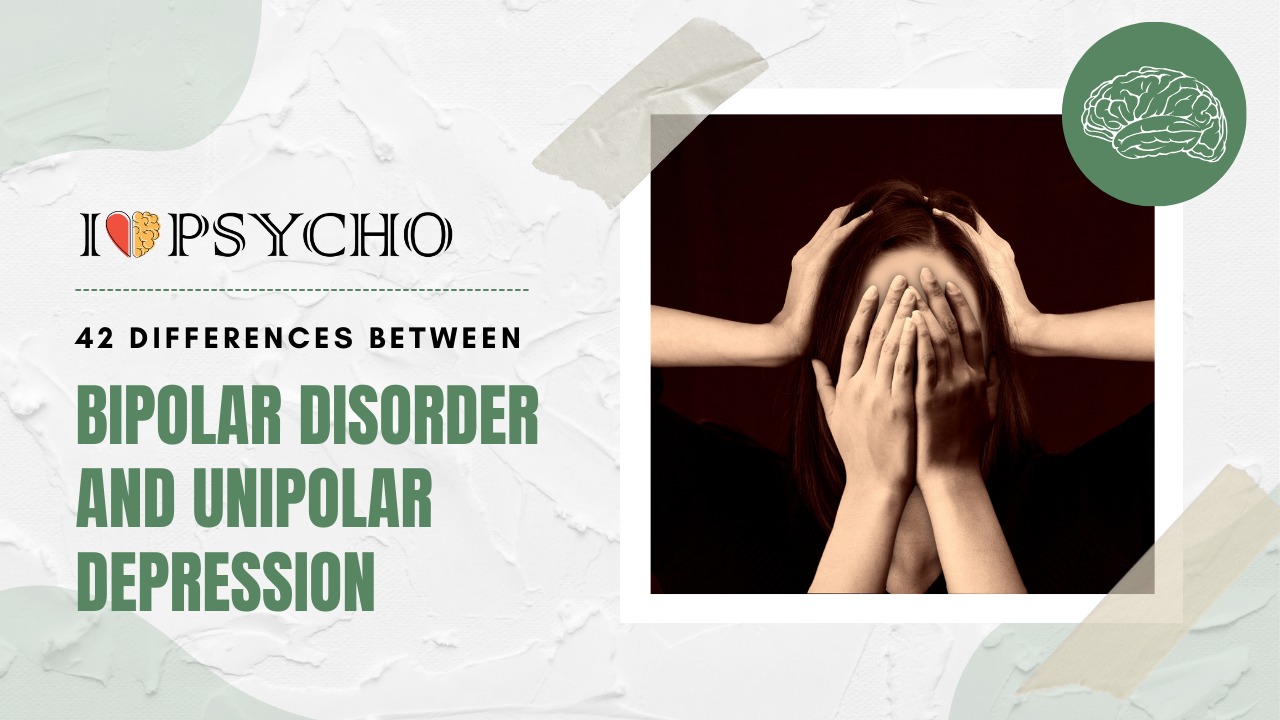Due to similar symptoms, bipolar disorder and unipolar depression are commonly mistaken. They differ greatly in symptomatology, course, and therapy.
Depressive episodes and manic or hypomanic episodes characterize bipolar disorder. Unipolar depression symptoms include poor mood, loss of interest, and weariness. Manic or hypomanic episodes entail increased energy, impulsivity, grandiosity, and decreased sleep. Unipolar Depression is recurring major depressive episodes without mania. This illness differs in mood trajectory. Depressive and manic episodes cycle in bipolar disorder. However, unipolar depression remains low without mania.
These illnesses are diverse; therefore treatment methods vary. To treat both depressed and manic episodes, bipolar disorder requires mood stabilizers, antipsychotics, or psychotherapy. Psychotherapy like cognitive-behavioral or interpersonal therapy and medications treats unipolar depression.
Neurobiology distinguishes these illnesses. Dopamine and serotonin imbalance causes mood fluctuations in Bipolar Disorder. Unipolar Depression is caused by serotonin imbalance. Both illnesses include genetics, however, the risk genes differ. Bipolar Disorder is stronger genetically and runs in families. Unipolar depression is genetically predisposed, but environmental influences are more important.
Disorders affect social and vocational life differently. Manic episodes in Bipolar Disorder can cause impulsive and dangerous behavior with serious consequences. Unipolar depression causes social disengagement and impaired productivity. Depression’s common symptoms complicate diagnosis. Unipolar Depression lacks manic or hypomanic symptoms and repeated episodes, which distinguish Bipolar Disorder.
In conclusion, diagnosing and treating Bipolar Disorder requires recognizing the 42 distinctions between Unipolar Depression and Bipolar Disorder. Despite sharing symptoms, many mood disorders differ in mood trajectory, therapy, neuroscience, genetics, social effect, and diagnostic criteria. Recognizing these differences helps that patients receive personalized care, improving results and quality of life.
Also Read: 39 Difference Between Bipolar Disorder and Major Depressive Disorder (MDD)
Here are 42 differences between bipolar disorder and unipolar depression:
|
S.No. |
Aspects |
Bipolar Disorder |
Unipolar Depression |
|
1 |
Mood Swings |
Characterized by mood swings between manic and depressive episodes. |
Characterized by persistent low mood or depression. |
|
2 |
Mania |
Involves manic or hypomanic episodes. |
Does not involve manic episodes. |
|
3 |
Depressive Episodes |
Also experiences depressive episodes. |
Primarily characterized by depression. |
|
4 |
Emotional Extremes |
Exhibits extreme emotional highs and lows. |
Typically characterized by emotional lows. |
|
5 |
Duration of Episodes |
Manic and depressive episodes can last days to weeks. |
Depressive episodes can last for weeks or months. |
|
6 |
Energy Levels |
High energy during manic episodes; low energy during depressive episodes. |
Generally low energy throughout. |
|
7 |
Sleep Patterns |
Decreased need for sleep during mania; increased need during depression. |
Sleep disturbances, often involving insomnia. |
|
8 |
Speech Patterns |
Rapid speech during mania; slow speech during depression. |
May have slowed speech but not rapid speech. |
|
9 |
Self-Esteem |
Inflated self-esteem during mania; low self-esteem during depression. |
Low self-esteem is common throughout. |
|
10 |
Decision Making |
Impulsivity and poor decision-making during manic episodes. |
Less likely to engage in impulsive behavior. |
|
11 |
Concentration |
Difficulty concentrating during manic episodes; difficulty in depression as well. |
Difficulty concentrating primarily during depressive episodes. |
|
12 |
Suicidal Thoughts |
Elevated risk of suicidal thoughts during depressive episodes. |
Higher risk of suicidal thoughts throughout. |
|
13 |
Psychosis |
Can experience psychotic symptoms during manic or depressive episodes. |
Psychotic symptoms are rarer in unipolar depression. |
|
14 |
Family History |
Higher likelihood of a family history of bipolar disorder. |
Family history may be present but is more common in bipolar disorder. |
|
15 |
Onset Age |
Typically begins in late adolescence or early adulthood. |
Can start at any age, often in adulthood. |
|
16 |
Medication |
Requires mood stabilizers like lithium or anticonvulsants. |
Often treated with antidepressants. |
|
17 |
Treatment Response |
May require multiple medications to manage both manic and depressive episodes. |
Typically treated with a single antidepressant. |
|
18 |
Relapse |
May experience relapses or mood swings even with treatment. |
May experience recurrent depressive episodes. |
|
19 |
Cognitive Function |
Cognitive function may be impaired during manic and depressive episodes. |
Cognitive function primarily impaired during depressive episodes. |
|
20 |
Risky Behaviors |
More prone to engaging in risky behaviors during mania. |
Less prone to risky behaviors overall. |
|
21 |
Social Functioning |
Impaired social functioning during both manic and depressive episodes. |
Impaired social functioning primarily during depressive episodes. |
|
22 |
Treatment Approach |
Requires a comprehensive approach to manage both manic and depressive phases. |
Focuses on managing and treating depressive symptoms. |
|
23 |
Medication Side Effects |
May experience side effects from mood stabilizers. |
May experience side effects from antidepressants. |
|
24 |
Seasonal Patterns |
Not typically influenced by seasonal changes. |
Seasonal affective disorder is a subtype of unipolar depression. |
|
25 |
Genetic Factors |
Strong genetic component in bipolar disorder. |
Genetic factors also play a role in unipolar depression. |
|
26 |
Comorbid Conditions |
Increased risk of comorbid conditions, such as substance abuse. |
Comorbid conditions may include anxiety disorders. |
|
27 |
Response to Stress |
Mood episodes can be triggered or exacerbated by stress. |
Depression can be triggered or worsened by stress. |
|
28 |
Creativity |
Some individuals with bipolar disorder experience bursts of creativity during manic episodes. |
Creativity is less influenced by mood in unipolar depression. |
|
29 |
Severity of Symptoms |
Symptoms can be more severe during manic and depressive episodes. |
Symptoms are generally less severe in unipolar depression. |
|
30 |
Hospitalization |
May require hospitalization during severe manic or depressive episodes. |
Hospitalization is less common in unipolar depression. |
|
31 |
Treatment Goals |
Treatment aims to stabilize mood and prevent manic and depressive episodes. |
Treatment aims to alleviate depressive symptoms. |
|
32 |
Hypersensitivity |
May experience heightened sensitivity to sensory stimuli during manic episodes. |
Hypersensitivity may be less prominent in unipolar depression. |
|
33 |
Insight |
Individuals with bipolar disorder may have reduced insight into their condition during manic episodes. |
Generally have insight into their condition. |
|
34 |
Recurrence |
Recurrent manic and depressive episodes are common. |
Recurrent depressive episodes are common. |
|
35 |
Functioning During Mania |
Often impaired in daily functioning during manic episodes. |
Daily functioning may be less impaired in unipolar depression. |
|
36 |
Seasonal Patterns of Episodes |
Not typically influenced by seasonal changes. |
Seasonal affective disorder is characterized by seasonal patterns. |
|
37 |
Hypomania |
May experience hypomanic episodes, which are less severe than full manic episodes. |
No hypomanic episodes in unipolar depression. |
|
38 |
Euphoria |
Euphoric mood during manic episodes. |
Euphoria is not a characteristic feature of unipolar depression. |
|
39 |
Treatment Duration |
Lifelong management may be required for bipolar disorder. |
Treatment duration varies but may be shorter for unipolar depression. |
|
40 |
Irritability |
Irritability can be a prominent feature during manic and depressive episodes. |
Irritability is more common in depression but less severe. |
|
41 |
Substance Abuse |
Higher risk of substance abuse during manic episodes. |
Substance abuse can be a comorbid condition in depression but is less linked to mood swings. |
|
42 |
Quality of Life |
Quality of life can be significantly impacted by mood swings in bipolar disorder. |
Quality of life is often affected by persistent depressive symptoms in unipolar depression. |
Also Read: What Clinical Psychologists Do Professionally
Frequently Asked Questions (FAQS)
Q.1 What distinguishes Bipolar Disorder from Unipolar Depression?
The mood trajectory distinguishes. Depression and manic/hypomania are cyclical in Bipolar Disorder. Unipolar Depression is recurring major depressive episodes without mania.
Q.2 Does Bipolar Disorder resemble Unipolar Depression?
Yes, owing to depressed symptoms overlapping. Missing manic or hypomanic episodes in Bipolar Disorder might lead to misdiagnosis. To distinguish the two, thorough examination and history-taking are needed.
Q.3 Do both illnesses have similar treatments?
No, treatment methods vary. Bipolar Disorder requires mood stabilizers and antipsychotics for depressed and manic episodes. Unipolar depression is treated with medications and CBT.
Q.4 Are both illnesses genetic?
Bipolar Disorder and Unipolar Depression are genetically predisposed. Bipolar Disorder is more hereditary and runs in families. Unipolar Depression is inherited, but environmental influences are more important.
Q.5 How do these illnesses affect daily life?
The effect varies. Manic bouts of Bipolar Disorder can cause impulsivity, risk-taking, and relationship problems. Unipolar Depression causes social disengagement, poor productivity, and everyday functioning issues.









